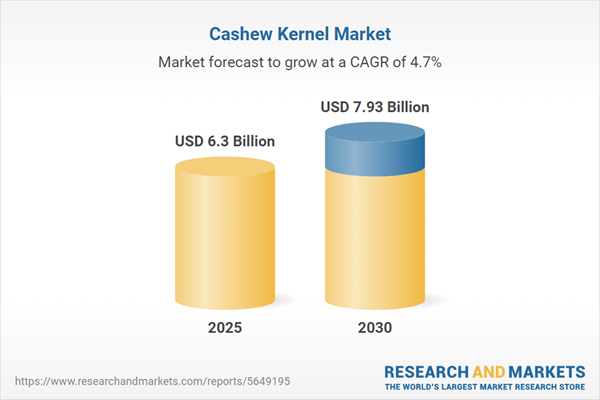The cashew kernel market is expanding rapidly due to growing consumer awareness of the health benefits of cashews. The nutritional value of cashews, including protein, healthy fats, and vital vitamins, has also attracted health-conscious consumers. Additionally, as plant-based diets are rising, cashews are becoming increasingly popular due to their versatility across a range of recipes-from dairy alternatives to snacks and desserts, leading to high growth. According to a report by the IBEF for 2024, there are 0.7 million hectares of land occupied by cashew cultivation, and its annual production is more than 0.8 MT.
Market Trends:
- Expanding Export Opportunities: The cashew kernel market is benefiting from increasing export potential across various regions. Improved international trade policies and cooperation are enabling cashew producers to access foreign markets more effectively. Cashew kernels, versatile as both snacks and ingredients, are gaining global popularity, further boosting market growth.
- Rising Disposable Income: In emerging markets like Asia and Africa, growing disposable incomes are driving lifestyle changes, leading to higher consumption of processed foods and snacks, including cashews. As incomes continue to rise in these regions, demand for premium, value-added cashew products is expected to grow significantly in the coming years.
- Popularity of Convenience Foods: Canned cashew kernels and other convenient food options are becoming increasingly popular, particularly among working individuals with busy schedules. Factors such as lack of time, fatigue, and the need for quick meal solutions are driving the demand for these products.
- Asia-Pacific’s Market Growth: The Asia-Pacific region is poised to contribute significantly to the global cashew kernel market. For example, in Vietnam, the Ministry of Agriculture and Rural Development (MARD) has recognized cashews as one of 13 national products. Under Decree 57/2018/ND-CP, cashews are eligible for preferential support measures, encouraging investments in agriculture and related sectors, further boosting market growth.
Key Benefits of this Report:
- Insightful Analysis: Gain detailed market insights covering major as well as emerging geographical regions, focusing on customer segments, government policies and socio-economic factors, consumer preferences, industry verticals, and other sub-segments.
- Competitive Landscape: Understand the strategic maneuvers employed by key players globally to understand possible market penetration with the correct strategy.
- Market Drivers & Future Trends: Explore the dynamic factors and pivotal market trends and how they will shape future market developments.
- Actionable Recommendations: Utilize the insights to exercise strategic decisions to uncover new business streams and revenues in a dynamic environment.
- Caters to a Wide Audience: Beneficial and cost-effective for startups, research institutions, consultants, SMEs, and large enterprises.
What can businesses use this report for?
Industry and Market Insights, Opportunity Assessment, Product Demand Forecasting, Market Entry Strategy, Geographical Expansion, Capital Investment Decisions, Regulatory Framework & Implications, New Product Development, Competitive Intelligence.Report Coverage:
- Historical data from 2022 to 2024 & forecast data from 2025 to 2030
- Growth Opportunities, Challenges, Supply Chain Outlook, Regulatory Framework, and Trend Analysis
- Competitive Positioning, Strategies, and Market Share Analysis
- Revenue Growth and Forecast Assessment of segments and regions including countries
- Company Profiling (Strategies, Products, Financial Information, and Key Developments among others)
The Cashew Kernel Market is analyzed into the following segments:
By Form
- Wholes
- Brokens
- Butts
- Pieces
- Splits
By Cultivation Type
- Organic
- Conventional
By Processed Type
- Raw
- Dried
- Flavoured
- Others
By Packaging Type
- Bags
- Boxes
- Cartons
- Others
By Shell
- In-shell
- Shelled
By Distribution Channel
- Online
- Offline
By Region
- North America
- Europe
- Asia Pacific
- South America
- Middle East & Africa
Table of Contents
Companies Mentioned
- AVC Nuts
- NUTSCO (Usibras)
- Cashew Group
- KardiaNuts
- A.M.A. Gesellschaft für Food Be- und Verarbeitung mbH Nussveredelungsmanufaktur
- Prime Nuts FZE
- Afokantan Benin Cashew
- Bismi Cashew Company
- Vietnam Cashew Co.
Table Information
| Report Attribute | Details |
|---|---|
| No. of Pages | 160 |
| Published | March 2025 |
| Forecast Period | 2025 - 2030 |
| Estimated Market Value ( USD | $ 6.3 Billion |
| Forecasted Market Value ( USD | $ 7.93 Billion |
| Compound Annual Growth Rate | 4.7% |
| Regions Covered | Global |
| No. of Companies Mentioned | 9 |









